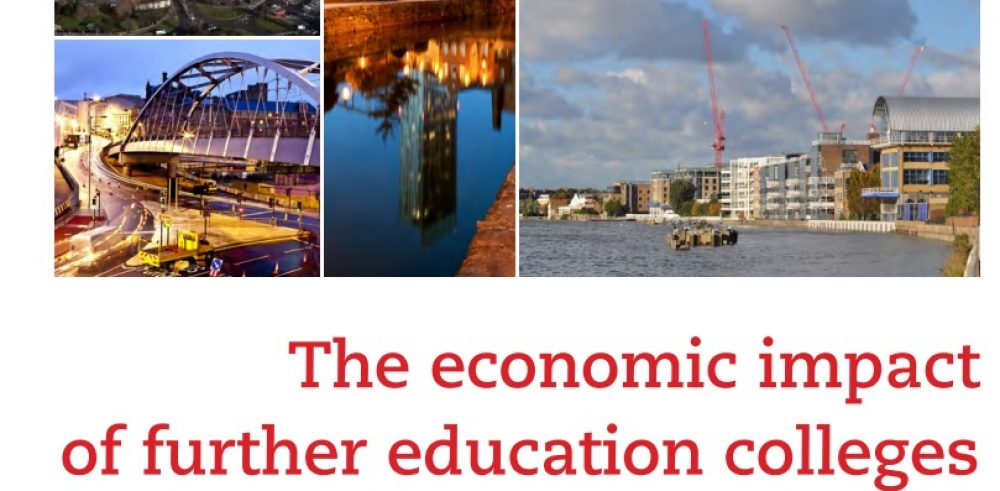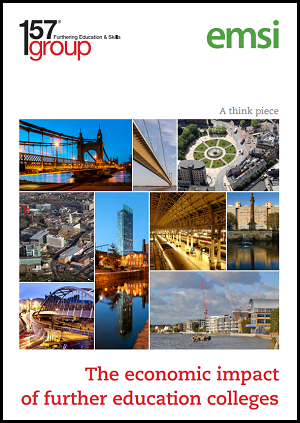The average impact of a college on its local economy is around £550m, according to a 157 Group report out today warning the FE sector should not be “ignored” or “undermined” by government.
The report, which is the result of studies conducted with 157 Group members over a number of years and across different regions, also claims college learners receive an average 11.2 per cent return on investment in terms of higher future earnings.
It goes on to say that society receives a 12.6 per cent return in terms of an expanded tax base and reduced social costs, while the taxpayer receives a 12.3 per cent average return, in the form of increased returns for the exchequer.
It says: “Colleges generate a wide array of benefits, many of which are not fully appreciated: learners benefit from higher lifetime earnings; society benefits from avoided social costs; taxpayers benefit from an expanded tax base; local businesses benefit from increased consumer spending; local employers benefit from a more productive local workforce.
“It can be tempting to see colleges simply as teaching and training centres and to neglect these wider effects.
“Certainly most people probably do not see them as an essential part of the economic lifeblood of their communities. However, economic impact studies have consistently dispelled this view.
“Time and time again colleges have been shown to be far more than centres of learning. They are an integral — even essential — part of local and regional economies, contributing to the growth of those economies, improving the lives of young people and adults by increasing their employability, and training a workforce in the essential skills that the local business community needs to prosper.”

Dr Lynne Sedgmore, 157 Group executive director, said: “What are the figures telling us? Quite simply, they show us that the FE sector is a vital part of the economic fortunes of their local and regional economies, and by extension that of the nation’s economy as a whole.
“Or to turn it around and answer the question that we began the previous section with, if colleges across the country were to close, given the impact seen in these three examples alone, can there be any doubt that the effects would be catastrophic?”
The report, produced with Economic Modelling Specialists International (EMSI), calls for the FE sector to be taken “more seriously than in the past” by the government, claiming that any attempted growth in the economy through a drive towards localism and regionalism which “downplays” colleges was “bound to fail”.
The report concludes: “As we move into a new parliamentary cycle, the national economy is sure to be one of the biggest challenges facing the new government. But as the drive towards localism and regionalism suggests, it is widely recognised that to have any chance of building a strong and successful national economy, building strong local and regional economies is essential.”
It goes on to say that the FE sector – or more particularly the individual colleges – have a “vital part” to play in anticipated growth, and that much of the impact and values of colleges “goes unseen”.
It continues: “What this means is that the FE sector is something that a government wanting to build solid and sustainable growth should not ignore, and must not undermine. We would go as far to say that any attempt to foster growth while downplaying an institution that provides so much positive impact to local and regional communities is ultimately bound to fail.”
Dr Sedgmore added: “This is the first time such a wide summary of work has been published and it confirms that the economic benefits colleges bring to business and the community are great. The report finds that, beyond the direct benefit to students and their employment chances, the benefit to local communities far outweighs the initial financial investment. Those of us working in the sector have long understood the importance of our work, but it is impressive to see the benefit of that work now quantified in economic terms.
“With the Queen’s Speech tomorrow likely to feature an enterprise bill, it is vital that policymakers recognise the vital contribution further education colleges make to the economy. Colleges are key employers and generators of wealth, as this report shows, and we hope that the government will trust college leaders to grow their offer and become more and more central to the economic recovery.”










Your thoughts